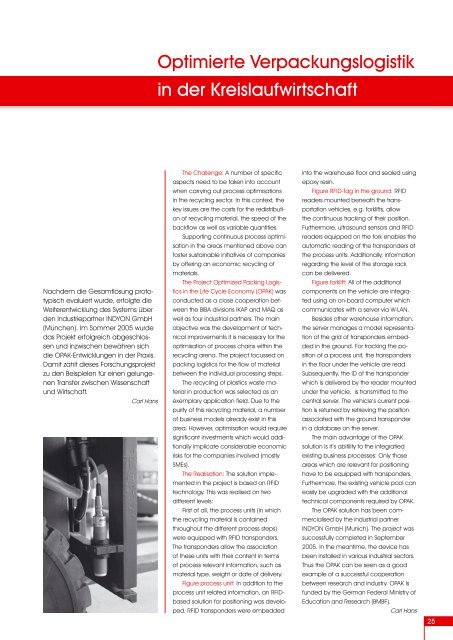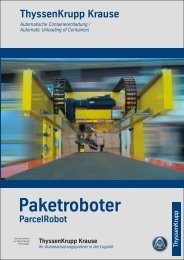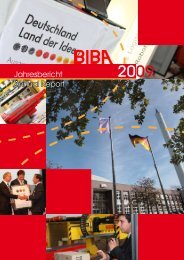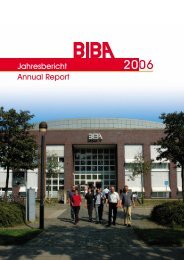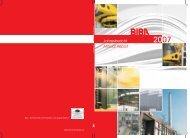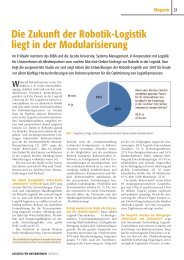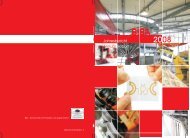Download - robotik-logistik.de
Download - robotik-logistik.de
Download - robotik-logistik.de
Sie wollen auch ein ePaper? Erhöhen Sie die Reichweite Ihrer Titel.
YUMPU macht aus Druck-PDFs automatisch weboptimierte ePaper, die Google liebt.
Nach<strong>de</strong>m die Gesamtlösung prototypisch<br />
evaluiert wur<strong>de</strong>, erfolgte die<br />
Weiterentwicklung <strong>de</strong>s Systems über<br />
<strong>de</strong>n Industriepartner INDYON GmbH<br />
(München). Im Sommer 2005 wur<strong>de</strong><br />
das Projekt erfolgreich abgeschlossen<br />
und inzwischen bewähren sich<br />
die OPAK-Entwicklungen in <strong>de</strong>r Praxis.<br />
Damit zählt dieses Forschungsprojekt<br />
zu <strong>de</strong>n Beispielen für einen gelungenen<br />
Transfer zwischen Wissenschaft<br />
und Wirtschaft.<br />
Carl Hans<br />
Optimierte Verpackungs<strong>logistik</strong><br />
in <strong>de</strong>r Kreislaufwirtschaft<br />
The Challenge: A number of specific<br />
aspects need to be taken into account<br />
when carrying out process optimisations<br />
in the recycling sector. In this context, the<br />
key issues are the costs for the redistribution<br />
of recycling material, the speed of the<br />
backflow as well as variable quantities.<br />
Supporting continuous process optimisation<br />
in the areas mentioned above can<br />
foster sustainable initiatives of companies<br />
by offering an economic recycling of<br />
materials.<br />
The Project Optimized Packing Logistics<br />
in the Life Cycle Economy (OPAK) was<br />
conducted as a close cooperation between<br />
the BIBA divisions IKAP and MAQ as<br />
well as four industrial partners. The main<br />
objective was the <strong>de</strong>velopment of technical<br />
improvements it is necessary for the<br />
optimisation of process chains within the<br />
recycling arena. The project focussed on<br />
packing logistics for the flow of material<br />
between the individual processing steps.<br />
The recycling of plastics waste material<br />
in production was selected as an<br />
exemplary application field. Due to the<br />
purity of this recycling material, a number<br />
of business mo<strong>de</strong>ls already exist in this<br />
area. However, optimisation would require<br />
significant investments which would additionally<br />
implicate consi<strong>de</strong>rable economic<br />
risks for the companies involved (mostly<br />
SMEs).<br />
The Realisation: The solution implemented<br />
in the project is based on RFID<br />
technology. This was realised on two<br />
different levels:<br />
First of all, the process units (in which<br />
the recycling material is contained<br />
throughout the different process steps)<br />
were equipped with RFID transpon<strong>de</strong>rs.<br />
The transpon<strong>de</strong>rs allow the association<br />
of these units with their content in terms<br />
of process relevant information, such as<br />
material type, weight or date of <strong>de</strong>livery.<br />
Figure process unit: In addition to the<br />
process unit related information, an RFIDbased<br />
solution for positioning was <strong>de</strong>veloped.<br />
RFID transpon<strong>de</strong>rs were embed<strong>de</strong>d<br />
into the warehouse floor and sealed using<br />
epoxy resin.<br />
Figure RFID-Tag in the ground: RFID<br />
rea<strong>de</strong>rs mounted beneath the transportation<br />
vehicles, e.g. forklifts, allow<br />
the continuous tracking of their position.<br />
Furthermore, ultrasound sensors and RFID<br />
rea<strong>de</strong>rs equipped on the fork enables the<br />
automatic reading of the transpon<strong>de</strong>rs at<br />
the process units. Additionally, information<br />
regarding the level of the storage rack<br />
can be <strong>de</strong>livered.<br />
Figure forklift: All of the additional<br />
components on the vehicle are integrated<br />
using an on-board computer which<br />
communicates with a server via W-LAN.<br />
Besi<strong>de</strong>s other warehouse information,<br />
the server manages a mo<strong>de</strong>l representation<br />
of the grid of transpon<strong>de</strong>rs embed<strong>de</strong>d<br />
in the ground. For tracking the position<br />
of a process unit, the transpon<strong>de</strong>rs<br />
in the floor un<strong>de</strong>r the vehicle are read.<br />
Subsequently, the ID of the transpon<strong>de</strong>r<br />
which is <strong>de</strong>livered by the rea<strong>de</strong>r mounted<br />
un<strong>de</strong>r the vehicle, is transmitted to the<br />
central server. The vehicle’s current position<br />
is returned by retrieving the position<br />
associated with the ground transpon<strong>de</strong>r<br />
in a database on the server.<br />
The main advantage of the OPAK<br />
solution is it‘s abitility to the integratied<br />
existing business processes: Only those<br />
areas which are relevant for positioning<br />
have to be equipped with transpon<strong>de</strong>rs.<br />
Furthermore, the existing vehicle pool can<br />
easily be upgra<strong>de</strong>d with the additional<br />
technical components required by OPAK.<br />
The OPAK solution has been commercialised<br />
by the industrial partner<br />
INDYON GmbH (Munich). The project was<br />
successfully completed in September<br />
2005. In the meantime, the <strong>de</strong>vice has<br />
been installed in various industrial sectors.<br />
Thus the OPAK can be seen as a good<br />
example of a successful cooperation<br />
between research and industry. OPAK is<br />
fun<strong>de</strong>d by the German Fe<strong>de</strong>ral Ministry of<br />
Education and Research (BMBF).<br />
Carl Hans<br />
25


